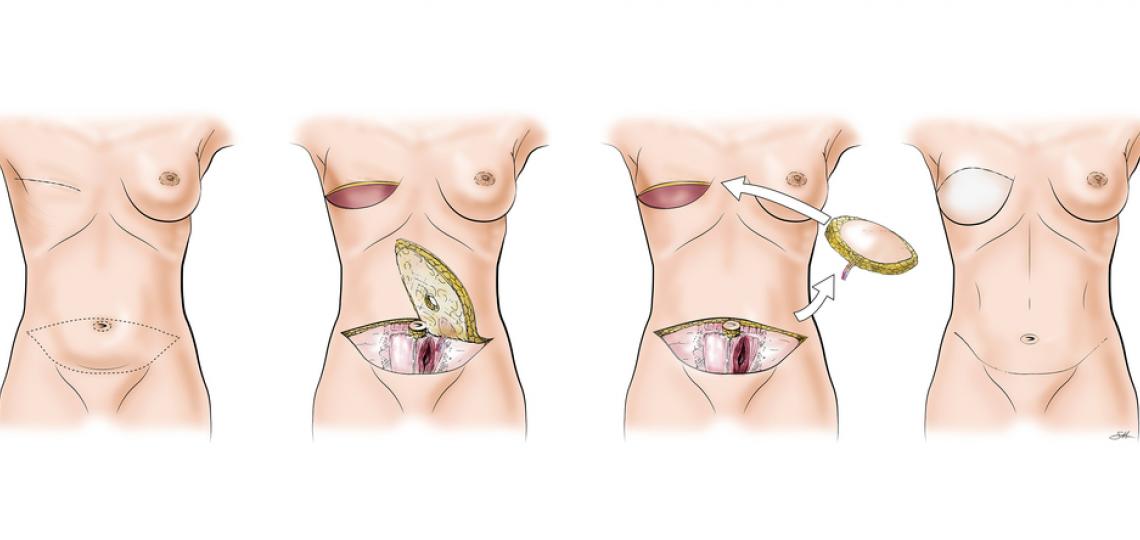What is DIEP Flap Surgery?
The deep inferior epigastric artery perforator or DIEP flap is a microsurgical technique in which blood vessels, skin and fat are taken from the lower abdomen and used to reconstruct the breast(s). DIEP flap surgery is an option for patients who have had a mastectomy, in which one or both breasts are removed because of breast cancer or to prevent breast cancer.
Advantages of the DIEP Flap Technique
The primary benefit of a DIEP flap over other breast reconstruction surgeries is that the procedure does not involve removing the abdominal muscle, which generally makes recovery time shorter and less painful. Many patients choose the DIEP flap because they prefer the natural look and feel of the final result, plus the added benefit of the reduction in belly fat. The DIEP flap is essentially a combination of breast reconstruction and a "tummy tuck."
Patients who undergo reconstructive surgeries in which the abdominal muscles are cut (such as a TRAM flap), often experience the side effects of a weakened abdominal wall, mobility issues, and are at increased risk of a hernia. Since all muscles remain intact with a DIEP flap, the risks for these conditions are significantly reduced.
Patients also do not have to worry about implant rupture or implant infection after the DIEP flap surgery since all tissue is taken directly from the patient's own body.
What Are the Types of DIEP Flap Surgery?
Immediate DIEP Flap Reconstruction - One Surgery, Two Procedures
An immediate DIEP flap reconstruction is performed by a plastic surgeon right after the breast cancer surgeon completes the mastectomy. The two procedures are done under the same anesthesia.
“Delayed” DIEP Flap Surgery
When a patient needs to have radiation therapy after a mastectomy, a “delayed” DIEP flap may be performed. A delayed DIEP flap procedure is simply a DIEP flap that is performed at a later date than the mastectomy, sometimes many years down the line.
“Staged” DIEP Flap Surgery
A staged DIEP flap surgery is similar to a delayed DIEP flap, except that at the time of the mastectomy, a tissue expander is inserted into the breast skin and muscle. The placement of the tissue expander, which helps maintain the formation of the breast, is considered the first stage of the DIEP flap surgery. The remaining stages of the surgery can be completed at a later date, depending on the need for radiation or chemotherapy post-mastectomy.
What is the DIEP Flap Recovery Like?
Total recovery time for the DIEP flap procedure is four to six weeks, with an initial hospital stay of about three to five days. Most patients can eat 24 hours after surgery and are mobile 48 hours after surgery. Once home, patients can return to daily activities. Heavy lifting or strenuous movement should be avoided. At the end of the initial procedure, three to four surgical drains will be placed at the incision site to release any excess fluid and promote healing. These drains will be taken out anywhere from one and three weeks after surgery. Every day during the recovery period, soreness and discomfort should decrease.
References
“Deep Inferior Epigastric Artery Perforator (DIEP) Flap.” Johns Hopkins Medicine. Accessed January 23, 2019.
Buntic, Rudolph. “Diep Flap Microsurgical Breast Reconstruction.” Microsurgeon.org. Accessed January 23, 2019.
“DIEP Flap Reconstruction: What to Expect.” Breastcancer.org. Accessed January 23, 2019.
“DIEP Flap, SIEA Flap, TRAM Free Flap.” BreastReconstruction.org. Accessed January 23, 2019.








 Credit
Credit
